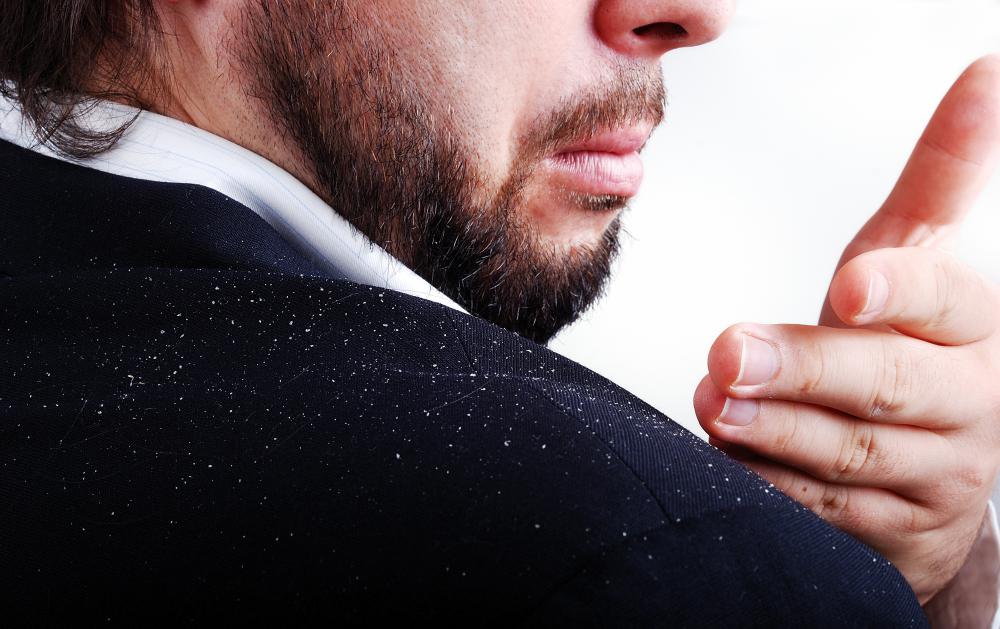At WiseGEEK, we're committed to delivering accurate, trustworthy information. Our expert-authored content is rigorously fact-checked and sourced from credible authorities. Discover how we uphold the highest standards in providing you with reliable knowledge.
What Is Antifungal Shampoo?
Antifungal shampoo is a product that is designed to treat seborrheic dermatitis, a type of dandruff that is caused by microscopic yeast. This condition is also known as cradle cap. There are several types of shampoo that are designed to treat fungal dandruff. These antifungal hair products use specific chemicals or plant extracts to discourage fungus growth. Antifungal shampoo won't cure dandruff that is caused by dry skin or other problems that are not related to yeast growth.
Most antifungal hair products use one primary chemical to treat dandruff. Patients who don't get relief from one brand of antifungal shampoo might be able to treat their symptoms by switching to a product that contains a different primary chemical. The active ingredients in these shampoos also work to suppress the growth of tinea versicolor, a fungus that discolors the skin.

Common shampoo chemicals include ketoconazole, ciclipirox olamine, piroctone olamine, zinc pyrithione and selenium sulfide. Ketoconazole might also work to reduce hair loss in balding men. Zinc pyrithione combats streptococcus and staphylococcus bacteria as well as fungi. Some older shampoo formulations treat dandruff with coal tar, which slows the process of skin cell loss.

Natural antifungal shampoo formulations often rely on tea tree oil. This substance comes from the Australia tea tree, or Melaleuca alternifolia. Tea tree oil is antifungal, antiseptic, antibacterial and antiviral. It also kills lice, mites and some other parasites.
Dandruff sufferers might not need to use antifungal shampoo at all times. They might have relatively normal skin much of the time, suffering flareups only rarely. Seborrheic dermatitis often worsens in winter or during periods of stress or fatigue. People who have the human immunodeficiency virus (HIV), acquired immune deficiency syndrome (AIDS) or neurological conditions such as Parkinson's disease might have more frequent flareups.

Seborrheic dermatitis includes skin inflammation and crusting skin as well as dandruff. Non-fungal dandruff usually lacks these extra symptoms. People who use antifungal shampoo to treat non-fungal conditions might show no improvement or even worsening of symptoms, because some antifungal treatments can dry the scalp and increase skin flaking.
Although shampoos that are meant to decrease fungal growth are generally safe, they might cause some problems. The potential side effects of antifungal shampoo include itching, burning and irritation of the scalp. Shampoo that contains selenium sulfide might discolor light or dyed hair. Tea tree oil preparations sometimes cause allergic reactions in sensitive individuals. Changing to a different antifungal shampoo usually resolves these problems.
AS FEATURED ON:
AS FEATURED ON:


















Discussion Comments
@fify-- Yea, tea tree oil is a great ingredient.
I don't use an anti-fungal shampoo but I use it regularly for my horses to keep their skin clean and free from infections. I don't want to advertise the brand, but it's a shampoo made specially for horses and has tea tree oil in it. It also has something called "triclosan." I'm guessing this is another anti-fungal ingredient.
I have a friend who uses this shampoo for her cat and dog too. So I know it's safe for most pets.
@SarahGen-- The shampoo you used, what was the active ingredient? Ketoconazole?
I have the same problem, but I also have flaking in addition to the other symptoms. Ketoconazole antifungal shampoo works for me. But if I ever stop using it for a while, all the symptoms come back. I just keep using it.
You could also try an antifungal shampoo that has tea tree oil or salyclic acid in it. I've heard that these are also great for treating fungi. My brother uses a tea tree oil shampoo and face wash for seborrheic dermatitis and has great results with it.
My doctor prescribed an antifungal shampoo for me recently. I went to visit my grandparents down South and I guess because of the heat and humidity, I developed a fungal infection on my scalp.
My scalp just itched all the time and it was unbelievably oily. My hair usually remains clean for two days but it was starting to get oily and smelly in just a few hours after washing because of the fungi.
Anyway, I used the shampoo for several weeks as directed. It worked really well the first week and the symptoms disappeared. But for some reason, it stopped working and all the symptoms came back the following weeks. I have no idea why but I'm disappointed.
Post your comments